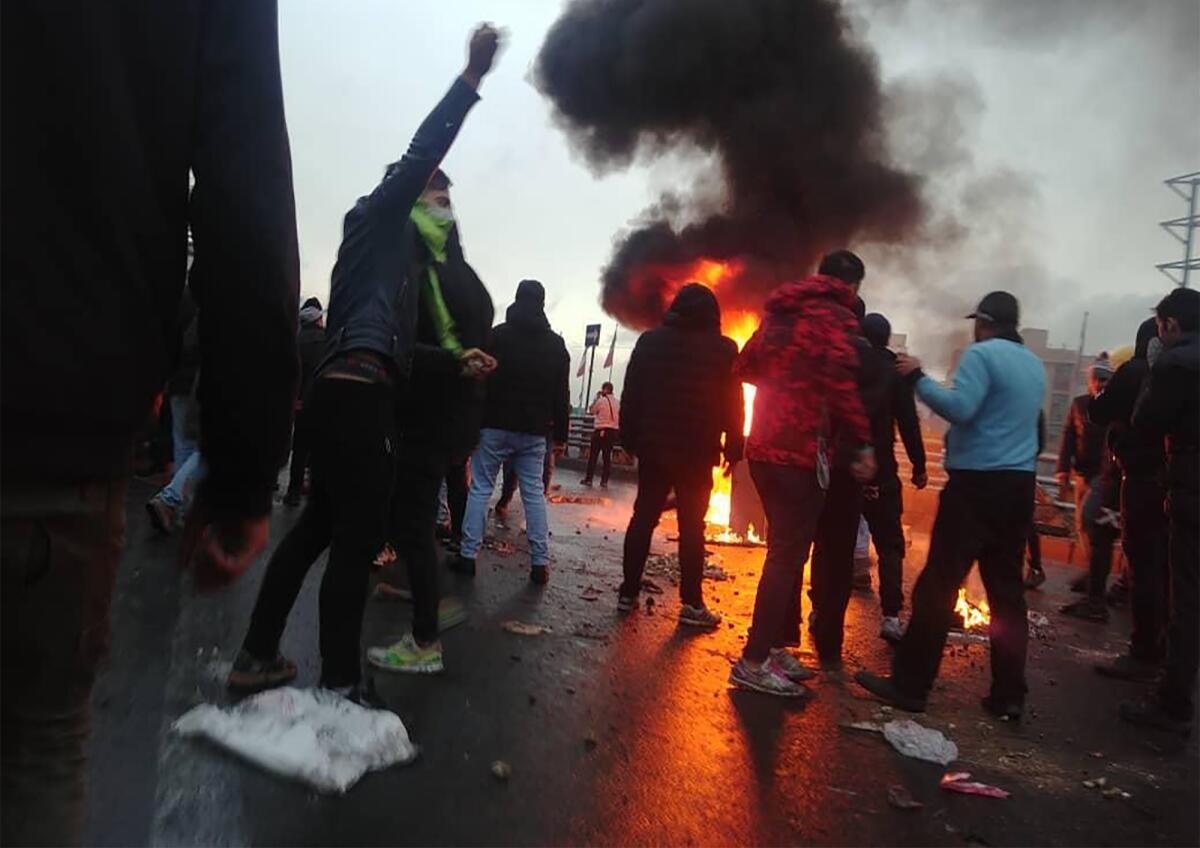Iran downplays, demonizes protests amid internet shutdown

- Share via
DUBAI, United Arab Emirates — Iran on Monday alternatively downplayed and demonized ongoing protests across the country that have killed at least five people and renewed pressure on the government as the country struggles under the weight of U.S. economic sanctions.
The full scale of the protests, which began shortly after a 50% increase in gas prices took effect early Friday, was unknown after Tehran shut down the internet over the weekend, blocking Iranians from sharing videos and information with the outside world. Before the shutdown late Saturday, some of the protest videos circulating online included sounds of gunfire and appeared to show gravely wounded people.
State media and authorities have released little information and a government spokesman predicted during a news conference that the unrest would be over in two days. But the spokesman, Ali Rabiei, also said demonstrators had taken police officers and security forces hostage. He did not release any details.
The protests were prompted by widespread anger among the Iranian people, who have seen their savings evaporate amid scarce jobs and the collapse of the national currency, the rial, since President Trump unilaterally withdrew America from the nuclear deal more than a year ago and imposed sanctions. The rial now trades at more than 123,000 to $1, compared with 32,000 to $1 at the time the deal took effect.
The streets were emptier than usual Monday in what is a generally busy capital. Shops saw few customers as uniformed police and plainclothes security forces walked the streets of Tehran. The all-volunteer force of Iran’s paramilitary Revolutionary Guard, known as Basij, said it was helping maintain security.
Speaking to journalists, Rabiei said mask-wearing protesters were “exercising very high levels of violence very professionally,” but insisted the protests would soon be over.
“Today the situation was calmer — more than 80% compared to yesterday,” the government spokesman said. “Only some minor problems remain, and by tomorrow and the day after, there will remain no special riots.”
The head of the Basij, Gen. Gholamreza Soleimani, said protest leaders had been arrested, but he did not elaborate.
“The security forces have dealt with the protesters by practicing restraint and patience,” the general said. “Destruction and disturbances have been done by rioters that we refer to as thugs and hoodlums.”
Iran has sought to blame violence on those linked to Iran’s late shah, ousted 40 years ago, and an exile group called the Mujahedin Khalq, or MEK. The MEK calls for the overthrow of Iran’s government and has the support of Trump’s personal lawyer, Rudolph W. Giuliani.
President Hassan Rouhani, who pushed for the hike in gas prices as part of a promise to increase payments to Iran’s poor, warned that authorities could track protesters down by their license plates. During the unrest, demonstrators abandoned their cars on major highways, blocking traffic.
Meanwhile, the official death toll rose to five Monday as the state-run Islamic Republic News Agency, or IRNA, reported that the violence has resulted in two more deaths. Previously, officials acknowledged the death of a police officer in the city of Kermanshah, one killed in a suburb of Tehran and another in Sirjan, a city about 500 miles southeast of the capital.
The semiofficial Fars News Agency, which is close to the Revolutionary Guard, has put the total number of protesters at more than 87,000, saying demonstrators ransacked about 100 banks and stores in the country. Authorities arrested about 1,000 people, Fars reported, citing unnamed security officials for the information.
Iran’s information and communications technology minister, Mohammad Javad Azari Jahromi, told IRNA that officials hope the situation will normalize and allow the internet to be restored. However, he told the news agency that “maintaining national security is very important.”
The protests represent a political risk for Rouhani ahead of February parliamentary elections as the government struggles to keep the country’s economy afloat.
Cheap gasoline is practically considered a birthright in Iran, home to the world’s fourth-largest crude oil reserves despite decades of economic woes since its 1979 Islamic Revolution. Gasoline in the country remains among the cheapest in the world, with the new prices increasing 50% to a minimum of 15,000 rials per liter. That’s 12 cents a liter, or about 50 cents a gallon. A gallon of regular gasoline in the U.S. costs $2.59 by comparison.
More to Read
Sign up for Essential California
The most important California stories and recommendations in your inbox every morning.
You may occasionally receive promotional content from the Los Angeles Times.










